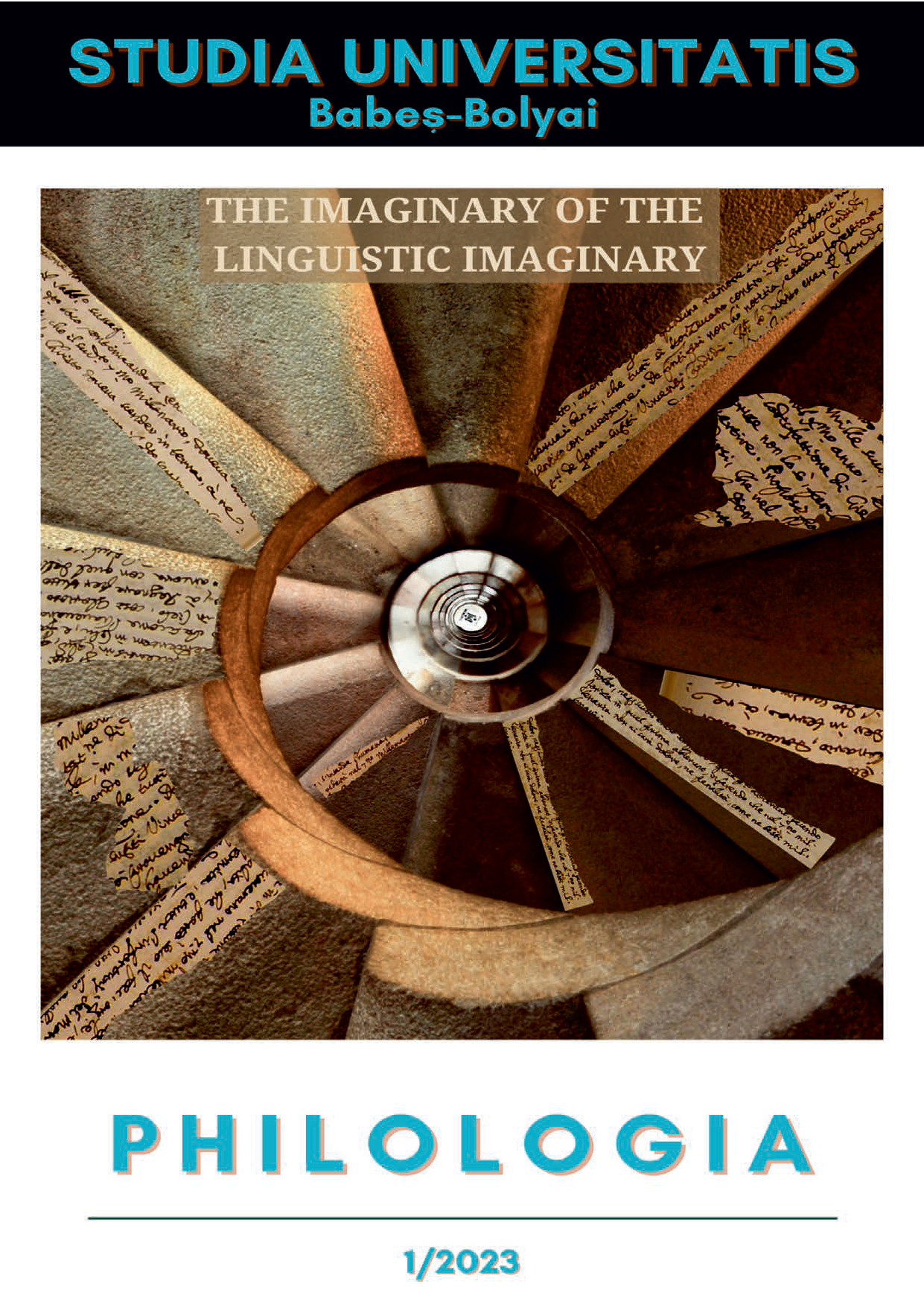POLITICAL MYSTICISM AND THE LEGIONARY MOVEMENT IN INTERWAR ROMANIA. A COGNITIVE APPROACH
DOI:
https://doi.org/10.24193/subbphilo.2023.1.08Keywords:
discourse, ideology, cognitive linguistics, mental space, conceptual integration, political religionAbstract
Political Mysticism and the Legionary Movement in Interwar Romania. A Cognitive Approach. The purpose of this article is to explore the public discourse of the Iron Guard, the often called “exotic” Romanian fascist movement. I will focus especially on the messianic figure of Corneliu Zelea Codreanu, the charismatic leader of the movement, and the long lasting fascination he has exerted in the Romanian public space for more than a century now. The approach taken here is based on Gilles Fauconnier’s and Mark Turner’s conceptual integration theory and it is an attempt to show how by blending various mental spaces, from religious elements to medieval historical characters and events, the movement managed to create a unique mix that seemed to set it apart from other European fascist movements. Its members were extremely young and, by all accounts, genuinely religious, even practicing a type of political „mysticism” that was rather uncommon elsewhere.
Misticism politic și mișcarea legionară în România interbelică. O abordare cognitivă. Articolul de față propune o incursiune în discursul public al Legiunii Arhanghelului Mihail, „exotica” mișcare fascistă românească din perioada interbelică. Ne vom concentra mai ales pe figura mesianică a lui Corneliu Zelea Codreanu, liderul carismatic al mișcării și pe fascinația pe care a exercitat-o și continuă s-o exercite în spațiul public românesc. Abordarea pe care o propunem pornește de la teoria integrării conceptuale a lui Gilles Fauconnier și a lui Mark Turner și reprezintă o încercare de a demonstra cum, prin amalgamarea mai multor spații mentale – de la elemente religioase la personaje și evenimente istorice –, mișcarea a reușit să creeze un univers unic, care-o separă de celelalte mișcări fasciste din epocă. Membrii Legiunii Arhanghelului Mihail erau, în general, extrem de tineri și, după toate aparențele, autentic religioși, practicând un fel de misticism politic greu de găsit în altă parte.
Cuvinte-cheie: discurs, ideologie, linguistică cognitivă, spații mentale, integrarea conceptuală, religii politice
Article history: Received 30 December 2022; Revised 24 February 2023; Accepted 28 February 2023; Available online 27 March 2023; Available print 31 March 2023.
References
Athanasius. 2004. “Against the Arians”. In Athanasius: Selected Works and Letters. Collection Nicene and Post-Nicene Fathers. Volume 4. Edited by Philip Schaff and Henry Wace. Hendrickson Publishers.
Cioran, Emil. “Profilul interior al Căpitanului”. Glasul Strămoșesc, Anul VI, Nr. 10, 1940.
Coulson, Seana. 2006. Semantic Leaps: Frame-Shifting and Conceptual Blending in Meaning Construction. Cambridge: Cambridge University Press.
Eatwell, Roger. 2003. “Reflections on Fascism and Religion”. Totalitarian Movements and Political Religions, 4 (3): 145–166.
Fauconnier, Gilles. 2007. “Mental Spaces”, in The Oxford Handbook of Cognitive Linguistics, edited by Dirk Geeraerts and Hubert Cuyckens, 351-376. Oxford: Oxford University Press.
Fauconnier, Gilles, and Turner, Mark. 2002. The Way We Think: Conceptual Blending and the Mind’s Hidden Complexities. New York: Basic Books, 2002.
Gentile, Emilio. 2010. “The sacralisation of politics: definitions, interpretations and reflections on the question of secular religion and totalitarism”, in Comparative Fascist Studies: New Perspectives, edited by Constantin Iordachi. London: Routledge.
Gentile, Emilio. 2004. “Fascism, totalitarianism and political religion: definitions and critical reflections on criticism of an interpretation”. Totalitarian Movements and Political Religions, 5: 326-375.
Gregory of Nyssa. 2004. “On the Making of Man”. In Gregory of Nyssa: Dogmatic Treatises. Etc. Collection Nicene and Post-Nicene Fathers. Volume 5. Edited by Philip Schaff and Henry Wace. Hendrickson Publishers.
Griffin, Roger. 2007. Modernism and Fascism: A Sense of a Beginning under Mussolini and Hitler. Basingstoke: Palgrave Macmillan.
Griffin, Roger. 1993. The Nature of Fascism. London and New York: Routledge.
Herseni, Traian. 1940. „Duhul Căpitanului”. Cuvântul, XVII (Serie nouă), nr. 53, 5 decembrie, 1940.
Ioanid, Radu. 1990. The Sword of the Archangel: Fascist Ideology in Romania. Translated by Peter Heinegg. New York: Columbia University Press.
Iordachi, Constantin. 2010. „God’s chosen worriors: Romantic palingenesis, militarism and fascism in modern Romania”. In Comparative Fascist Studies. New Perspectives, edited by Constantin Iordachi, 316-357. London: Routledge.
Iordachi, Constantin. 2023. The Fascist Faith of the Legion “Archangel Michael” in Romania, 1927–1941: Martyrdom and National Purification. London: Routledge.
Kermode, Frank. 2000. The sense of an Ending: Studies in the Theory of Fiction. Oxford: Oxford University Press.
Lakoff, George. 2009. “Metaphor and War: The Metaphor System Used to Justify War in the Gulf”. Journal of Cognitive Semiotics, IV(2): 5-19.
Lakoff, George, and Johnson, Mark. 1980. Metaphors We Live By. Chicago: University of Chicago Press.
Moș, Grigore-Dinu, and Octavian, Florin. 2020. Caiete de dogmatică. Arhitectonică și Apofatism. Cluj-Napoca: Presa Universitară Clujeană.
Moța, Ion. 1936. Cranii de lemn. Sibiu: Editura „Totul Pentru Tarã”.
Posteucă, Vasile. 1977. Desgroparea căpitanului. Madrid: Editura Mișcării Legionare.
Schmitt, Oliver Jens. 2017. Corneliu Zelea Codreanu. Ascensiunea și căderea căpitanului. București: Editura Humanitas.
Siugariu, Ion. 1940. „Destin catedralic”. Chemarea vremii, Anul XIV, Seria II, Nr. 24, Joi 14 Noembrie 1940.
Sonea, Cristian. 2023. “Theosis and Martyria—The Spiritual Process of Deification and Its Implication for the Mission of the Church”. Religions 14(1).
Sonea, Ioana. 2020. „Discurs și ideologe. Nașterea religiilor politice românești”. In Encicopedia imaginariilor din România. Patrimoniu și imaginar lingvistic, edited by Elena Platon, 319-348. Iași: Polirom.
Turner, Mark. 2007. “Conceptual Integration”. In The Oxford Handbook of Cognitive Linguistics, edited by Dirk Geeraerts and Hubert Cuyckens, 377-393. Oxford: Oxford University Press.
Zelea-Codreanu, Corneliu. 2015. The Prison Notes, Helsingborg: Logik Förlag.
Zelea-Codreanu, Corneliu. 2007. For My Legionaries. Translated by G. van der Heide. Madrid: Editura Libertatea.
Zelea-Codreanu, Corneliu. 2017. The Nest Leader Manual. Online English translation, https://www.incorectpolitic.com/wp-content/uploads/2017/09/The_Nest_Leaders_Manual_by_Corneliu_Zelea_Codreanu-_2017_English_Version.pdf.
Zelea-Codreanu, Corneliu. 1999. Pentru legionari. București: Editura Scara.
Downloads
Published
How to Cite
Issue
Section
License
Copyright (c) 2023 Studia Universitatis Babeș-Bolyai Philologia

This work is licensed under a Creative Commons Attribution-NonCommercial-NoDerivatives 4.0 International License.





 ©Studia Universitatis Babeş-Bolyai Philologia. Published by Babeș-Bolyai University.
©Studia Universitatis Babeş-Bolyai Philologia. Published by Babeș-Bolyai University.